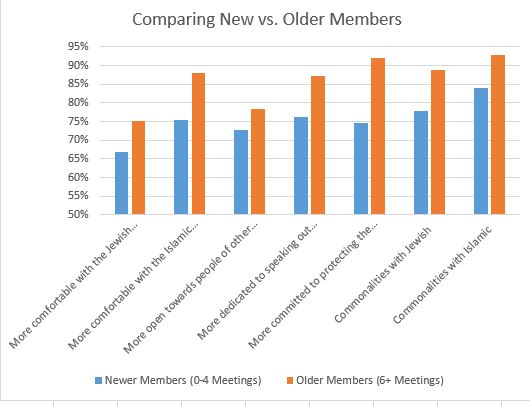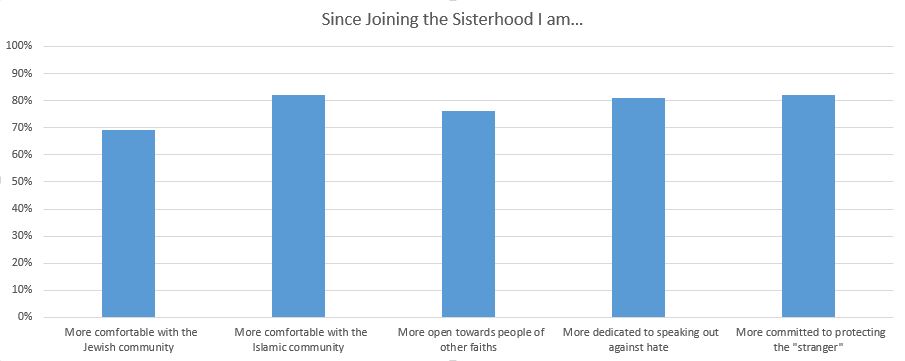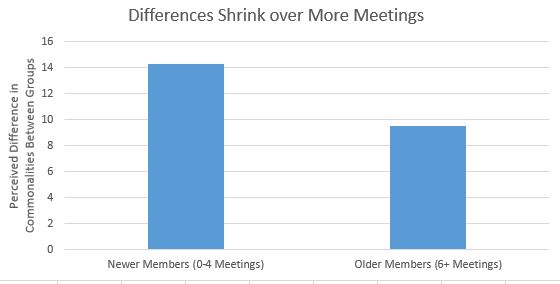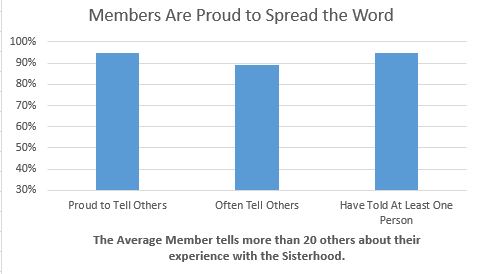Extended Contact and the Broader Impact of the Sisterhood of Salaam Shalom
“It’s really easy to hate someone you don’t know..but when you know them, it’s hard. And when you care about them and love them, it’s impossible.”
The above is a quote from the executive director of the Sisterhood of Salaam Shalom, an organization that brings together Muslim and Jewish women in friendship, with an eye toward affecting broader attitudes toward members of different faiths. Below is a video that summarizes their work, as well as their theory of change.
I have always been struck by how many groups independently come to the realization that the path to bridging divisions lies in building personal relationships first. In a similar vein to The Village Square, Living Room Conversations, Better Angels, and numerous other groups, The Sisterhood of Salaam Shalom intentionally puts friendship at the core of what they do. While there is ample research support for the idea that better relationships among individuals lead to better inter-group attitudes, it is certainly important to verify that these research studies extend to real world settings. As part of our ongoing work in bridging the academic and practitioner divide, we were able to survey 285 members of the Sisterhood to get some evidence as to how research on contact and extended contact effects maps to the real world.
Our findings indicate that members do indeed report better inter-group attitudes. As you can see below, most surveyed members self-report that they feel more comfort with others and more dedication to speaking out against divisive rhetoric.
- Members report better inter-group attitudes since joining
The people who take the survey are a self-selected sample of the membership, so it’s possible that this group is more positive about their experience with the Sisterhood. Another way of looking at whether change is occurring is to examine whether attending more meetings is associated with positive attitudes toward each group. The median number of meetings attended by survey participants was 5, so we examined those who attended 4 or fewer meetings in comparison with those who have attended 6 or more meetings. As you can see in the below graph, people who have attended more meetings report having more in common with members of each faith, as well as more improvement in their comfort with others and greater commitment to speaking out against divisive rhetoric.

Yet another way of looking at the effect of the Sisterhood is to see whether the differences that people perceive in terms of how much they have in common with Jewish or Muslim women shrinks. It is natural for a Jewish woman to believe they have more in common with other Jewish women, as compared to Muslim women, even as one may feel a lot in common with both groups. The same pattern is likely for Muslim women. Yet, as people get to know each other, one would expect this perceived difference to shrink, and the data indicates that it does. Specifically, people who attend more meetings show a smaller difference between their perceptions of how much they have in common between groups.
Of course, the people who choose to attend these events are likely not the ones who have extreme attitudes about the other group, so one might question if the Sisterhood is reaching those who most need to be reached. However, research does indicate that those who hear about others making friends across groups also have their attitudes affected (e.g. this work on extended contact effects). While we were not able to survey those who have heard about this work as of yet, we did ask members how much they told others about their experiences. 95% of people had told at least one person and 90% said that they “often” tell others, with 95% being proud to do so. On average, members tell 20 other people, with the median number being 10 and some people telling hundreds of others.
As a followup, we are currently doing work examining the experimental effects of hearing about the experiences of members and preliminary evidence indicates that people who read about these kinds of programs experience significantly better inter-group attitudes as well. We plan to follow up with a post on that soon. That being said, it is clear to us that the Sisterhood of Salaam Shalom is not only doing valuable work with a theory of change that is well supported by existing social science work, but also that there is substantial evidence that the Sisterhood is making a measurable impact on both their members and the communities that those members are a part of.
– Ravi Iyer
ps. If anyone reading this is or knows a Jewish or Muslim woman who would like to join a group or form a chapter, please do get in touch with the Sisterhood directly at https://sosspeace.org/.



